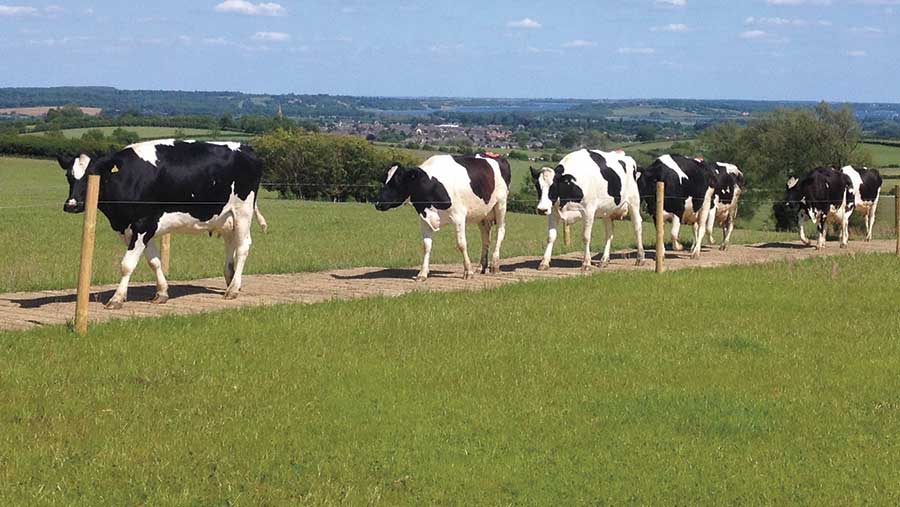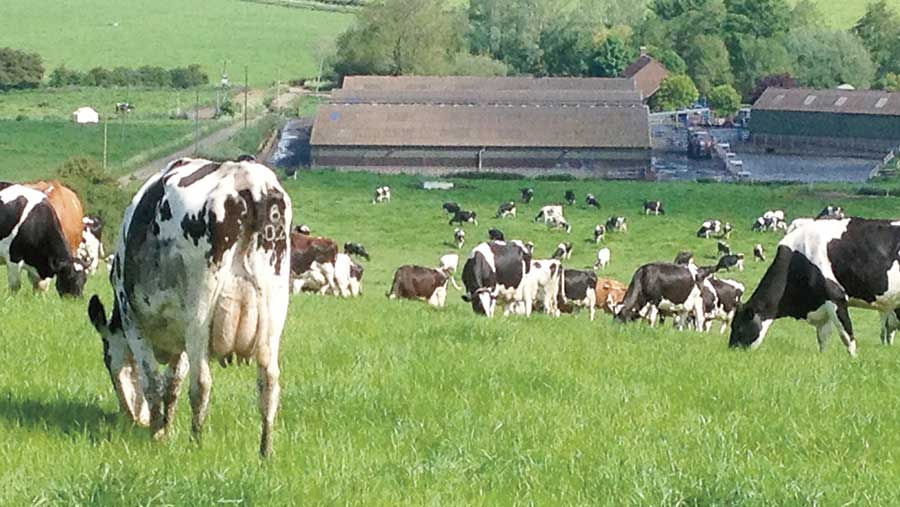Biological farming- what is it and how can it improve soil?

The implementation of a biological farming system has brought about one of the biggest changes at Keythorpe Farms in Leicestershire.
Wil Armitage manages the organic herd with business partner Peter Dixon-Smith, and believes this way of farming is the future for food production in both conventional and organic systems.
See also: More information on soil husbandry
Mr Armitage first came across the concept of biological farming when he travelled to America.
“The trip formed part of my Nuffield farming scholarship, which was looking at sustainable milk production. I took the opportunity to visit Organic Valley, the world’s leading organic farmer co-operative in North America.
“While there, I was fortunate to link up with Gary Zimmer, the pioneer of biological farming systems, who convinced me there was significantly more potential in our land.”
Keythorpe Farms facts
- Keythorpe Farms comprises 500ha, with about 420ha owned by Peter Dixon-Smith and Wil Armitage and the remainder rented on farm business tenancies.
- The enterprise milks 350 autumn-calving Holstein cows at Keythorpe and a further 220 spring-calving cows at Glebe Farm, with the milk going to the Organic Milk Suppliers Co-operative (Omsco).
- The spring-calvers are being bred to New Zealand Holstein Friesians for fertility and grazing ability
- Both herds are turned out in mid-February and housed in mid-November
- The autumn-calving herd averages 7,800 litres a cow a year at 3% butterfat and 3.4% protein
- The spring-calving herd averages 6,400 litres a cow a year at 4.1% butterfat and 3.3% protein
- More than 67% of the diet consists of forage and the system relies on growing top-quality forages within the constraints of organic practice
- Forages grown include grass silage, red clover, lucerne, fodder beet and diverse arable silages
About biological farming
Biological farming is about working with nature to improve soil, explains Mr Armitage.
“Biological farming works hand in hand with nature. It’s about balancing your soil to produce healthy, high-integrity crops, reducing the requirement for chemicals.”
When the farm switched from conventional to organic milk production in 2005 and started supplying the Organic Milk Suppliers Co-operative (Omsco), it led Mr Armitage to this method of farming.
As a result of the benefits observed since implementing the system, Mr Armitage says he would never return to traditional ways of production.
Reduce fertiliser use
Explaining the key elements of biological farming, Mr Armitage says the first step is to cease, or dramatically reduce, the application of soluble fertilisers and agrochemicals.
“While this may seem contradictory when trying to maximise outputs from land, they actually damage soil biology and inhibit microbial activity.”
Balancing minerals
Attention should then be given to a fertiliser policy to help balance the mineral levels in the soil, in particular, the calcium-magnesium ratio. Mr Armitage advises that soil testing is a must.
“It’s important to know your mineral base saturation. The traditional NPK system of analysis isn’t especially useful and a full mineral test is far more valuable to optimise output and soil health.
“Once you know what you’re working with, you can adopt a farm-specific fertiliser policy to address any shortfalls. For us, this means applying epsom salts and sulphur.
“It’s also crucial to ensure soil has sufficient energy to feed the microbes. To deliver this, we apply molasses to the ground at a rate of 12 litres/ha.”

Grow a range of crops
Having a diverse range of cropping systems and mixes is also integral to the system, adds Mr Armitage.
“We grow a range of forage crops, including grass, red clover, lucerne and fodder beet along with diverse arable silages. Different crops mobilise different minerals and by planting a mixture of crops and having tight rotations, you can increase output and improve soil heath.”
The benefits
Since making the changes to his system, Mr Armitage says he quickly saw improvements to the condition of the soil.
“Overall, the soil structure is much better and we can create an excellent seed-bed with significantly less tractor power than before, which gets crops off to a good start.
“The soil has changed from being dead with little biology, to a biological soil that has come alive, with increased microbial activity.”
For instance, Mr Armitage says he observed an increase in earthworms, which release nitrogen into the soil in a bio-available form when they die.
He also says an additional benefit is the soil warms up more quickly in the spring and is more resilient to adverse weather. During very wet periods, the soil drains much better and doesn’t become waterlogged, while in dry summers, it retains moisture better, which prevents cracking.
Top tips for better soils
- Get your soil tested to find out the mineral base saturation levels. The ratio of calcium to magnesium is particularly important
- Adopt a fertiliser policy to address the shortfalls
- Nurture soil biology by using diverse cropping rotations and mixes
- If grazing tightly, apply an additional energy source such as molasses, as there won’t be sufficient energy going back into the ground from root exudate
- Increase the potential of on-farm manures by making compost, which can be 10 times more effective than farmyard manure. Also consider inoculated slurry stores to decrease the negative effects of slurry on soil biology
To date he has seen an increase in forage yields and hopes by this summer to achieve a total of 10% more.
“We’ve also seen an improvement in sugar levels,” he adds. “However, the real benefit of the system comes from producing higher-integrity feeds, which are passed up the food chain.
“We now have a healthier herd of cows, with improved muscle definition, skin quality and brightness of eye. What’s more, we have a very low mastitis rate of 5.2 cases for every 100 cows in 2016.”
Dairy partner
As a supplier of milk to Omsco’s US premium pool, Mr Armitage says it has been great to have the opportunity to learn lessons from America.
“I’m now keen to share my knowledge of biological systems with other farmers.”
